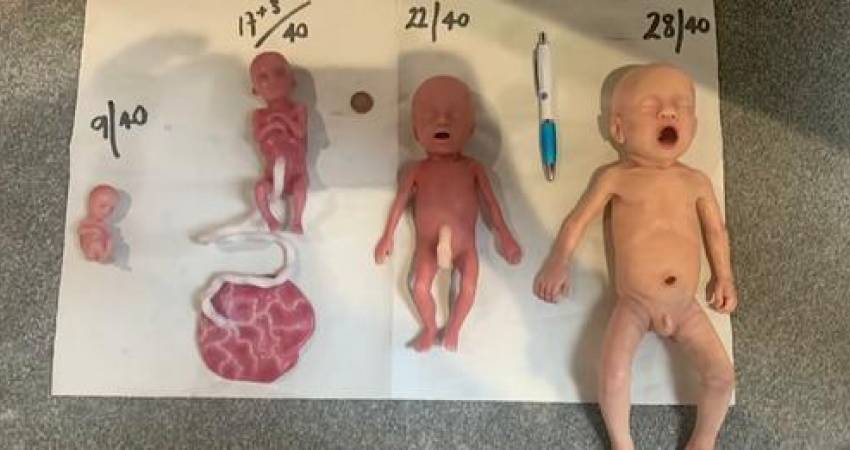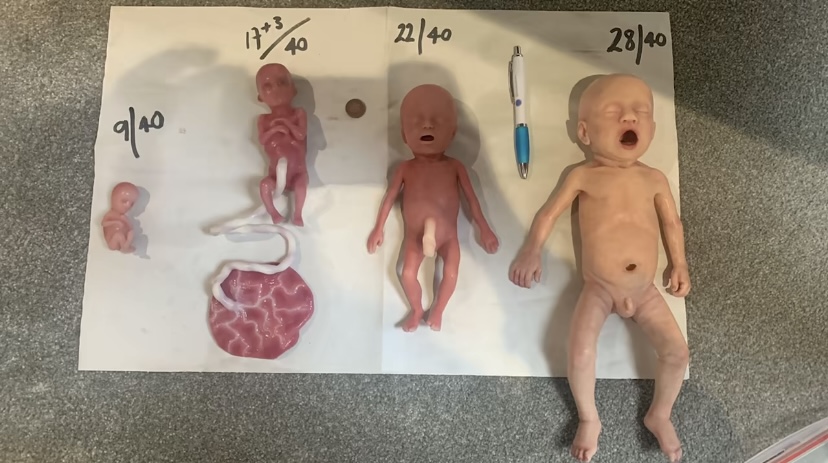
‘How to deal with babies that survive abortion pill: UK Ambulance staff shown baby mannequins’
An investigation released this week by GB News uncovered a significant rise in the number of women making 999 calls after taking abortion pills at home. And the investigation also uncovered a grim reality: ambulance staff are being trained in how to deal with aborted babies born alive after their mothers took abortion pills later in pregnancy.
The dreadful, shocking truth of Britain’s liberal abortion regime was laid bare in the devastating revelation that babies are being born alive after failed abortions using ‘DIY’ abortion pills in Britain.
“The National Network of Designated Health Care Professionals have recorded cases of women taking abortion pills when they’re too far along in their pregnancy, resulting in a small number of aborted babies being born alive,” the report states.
“As a result [of babies being born alive after abortion] a whistle-blower from one ambulance service told GB News that their ambulance trust has spent £7,000 on making special mannequins to train staff when confronted with this difficult situation”, GB News explains, showing the baby models, which look both life-like and at the same time surreal, given the purpose of their use.
GB News has found there’s been a significant rise in the number of women receiving ambulance care since at home abortion pills became widely available
It comes on the day that women will have permanent access to the medication in England and Wales
GB News' Alice Porter reports pic.twitter.com/rOhE9Bh7iS
— GB News (@GBNEWS) August 30, 2022
It is jarring to see the inclusion of a photo of a set of baby mannequins, paid for by an Ambulance Trust in the UK, designed to help staff when confronted with the horrendous situation of tiny babies being born alive after a failed abortion. The mannequins represent babies at 9 weeks, 20 weeks, 22 weeks, and 28 weeks gestation — well above the point of viability:

The report doesn’t address what paramedics or ambulance staff are meant to do: keep the baby alive, provide oxygen, hold the baby and comfort them – or none of the above. It is an appalling vista. These children were aborted, yet they have survived. Surely the human – and humane – response is to help them.
But we are, as ever, in danger of ignoring what is happening in our own backyard.
As reported by Gript in November 2020, two and a half years after Ireland’s referendum on abortion, the horrifying possibility – raised by pro-life campaigners before the vote – that Irish babies might be born alive as a result of abortions and left to die, was realised.
A report from researchers from University College Cork laid out in black and white in the British Journal of Obstetrics and Gynaecology how Irish doctors were “begging” for medical staff to provide palliative care for dying babies, who were surviving late-term abortion.
The thought of it almost makes me physically sick.
Likewise, the photo of the baby models, and the thought of them being used to train ambulance staff who are being met with real-life babies dying slow, cruel deaths, should drive us, as human beings with any sense of decency or compassion, to call for an inquiry.
But most of the media choose to ignore these realities – covering up the horrific outcomes by the complicity of their silence.
The UCC research wasn’t just ignored, politicians denied its existence. Even in the rare instances when some of these horrifying outcomes make news headlines, abortion providers offer the excuse that the gruesome deaths of tiny babies are ‘rare’, and that the majority of abortions, of babies younger by just a matter of weeks, are done safely and legally.
The GB News report, however, also tore a great big hole in the narrative put forward by big-money UK abortion providers, and repeated routinely in the media, that chemical abortion is something pro-woman, and part of a regime which has the welfare and well-being of women at its core.
Reporter Alice Porter talked to a woman who had found herself trapped in an abusive, controlling relationship, and was put under severe pressure from her partner to abort their baby.
37-year-old Kirsty Deakin was brave enough to speak publicly to GB News, in a climate where few women talk publicly about experiencing abortion especially when trauma and devastation follows. She is just one of thousands upon thousands of women who had an abortion in 2020; government statistics show that 209,917 abortions took place in England and Wales that year alone, a record high, which gives a grave indication of the scale of the throwaway culture sweeping Britain unabated.
Ms Deakin, from the West Midlands of England, shared how she was forced by her boyfriend to order the abortion pills. She told the reporter that she was hoping against hope that someone – anyone – would stop her from having the abortion:
“I made the call to an abortion clinic sort of hoping they’d question my decision.
“Because I knew deep down, I didn’t want to do it. They didn’t even offer me a scan…I could have been anyone on the phone when I rang for the pills.”
Yet, with the requirement for face-to-face consultation scrapped, she was – under severe pressure from her boyfriend – able to access abortion pills through one single phone call, without any safeguarding or checks put in place.
She is also correct that she could have been anyone when ordering the abortion pills. As was reported in the press earlier in the summer, one senior civil servant in England, who was married and having an affair, was found guilty of trying to spike his lover’s drink with crushed up abortion pills after encouraging the mother-of-two to abort the child and sending her links to an abortion clinic.
Ms Deakin told GB News that she ended up taking the abortion pills beyond the legal ten-week limit, at a stage where her unborn child, according to the NHS, would have been growing rapidly, capable of making small, jerky movements that could be seen on an ultrasound scan, with fingernails, and fingers and toes starting to separate, with a fully formed heart beating 180 times a minute.
As she told the reporter, she wasn’t offered a scan, and she went ahead with the abortion of her child, alone, desperate and coerced. The abortion, and the associated trauma and grief, is something she will forever have to live with.
“[I had] terrible cramps for hours. Then, once I lifted my blanket, I was saturated in blood,” Ms Deakin told the reporter, holding back tears. “It was horrible. It was my baby’s blood”, she told the reporter, sobbing.
Does this sound like empowerment? Is this our idea of healthcare?
With the prevalence of abortion pills in both the U.K. and Ireland, it is also well worth remembering that those who wished to legalise abortion during Ireland’s 2018 referendum said a key reason they wanted to do so was because women were taking ‘dangerous’ abortion pills at home, without medical supervision.
Four years on, we now see those same abortion campaigners celebrate women’s unfettered access to abortion pills, while calling for broader, less restricted, faster and easier access to the same ‘DIY’ abortions they cited as a primary reason for repealing the eighth.
The unidentified ambulance trust’s baby models are a devastatingly accurate symbol of the grisly, violent, upsetting reality of abortion pills. It’s time for women to know that this is not an ‘easy way out’ of a crisis pregnancy, and it’s past time for our society to sit up and start counting the very human cost of abortion.
This piece was first published on Gript.
Featured
- Abortion coercion has arrived in Ireland – the NWC are silent
- Review of at-home abortions 'needed after coercion case'
- French Govt to remind 29-year-olds of biological clock
- Huge factor in decline in primary school numbers ignored
- Germany Denies Promoting Abortion Abroad—While Funding Pro-Abortion NGOs
- Govt don’t oppose Coppinger abortion bill at 1st stage
- March for Life: Vance, the White House, and a Divided Pro-Life Movement
- Paris’ Annual March for Life Puts Euthanasia in the Spotlight
- Britain’s seemingly limitless abortion rate
- The importance of the work carried out by Every Life Counts
- Puerto Rico officially recognizes unborn children as ‘natural persons’
- Assisted suicide laws stalled by “complex” legal issues
- Yes, that hideous celebration of 300 abortions is real
- White Crosses Memorial: Dungarvan once again pays its respects to our aborted babies
- Josiah: Abortion Survivor
- Rally for Life 2025
You can make a difference.
DONATE TODAY